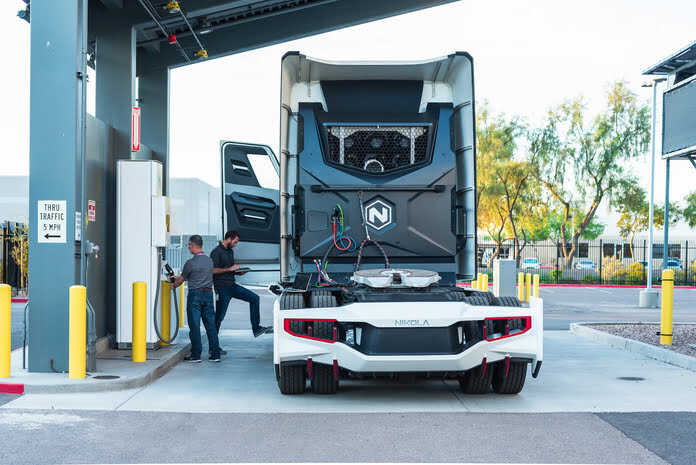The electric truck startup, Nikola Corp (NASDAQ:NKLA), made its debut on the Nasdaq exchange on June 4, 2020, following a reverse merger with VectoIQ. Initially, the market buzzed with excitement as the stock kicked off trading at $37.55 per share and surged to an all-time high of $93.99 by June 9, 2020.
However, the once-promising “Tesla of trucking” has encountered a sharp downturn, leaving investors disheartened. Presently, NKLA is trading slightly above $1 per share, a substantial drop from its previous peaks but is this an enticing opportunity for investment?
The Ups and Downs of NKLA’s Journey
In 2020, the market witnessed a wave of green vehicle manufacturers entering through SPAC mergers to capitalize on the EV frenzy, including Nikola. Initially, the company attracted substantial attention, even briefly surpassing Ford’s market capitalization due to optimism surrounding EVs. However, this momentum faltered after Hindenburg Research published a report raising concerns about misleading information, leading to the resignation of CEO Trevor Milton. Consequently, the stock plummeted from its peak of $93.99 on June 9 to a low of $13.51 on December 24.
The challenges persisted in 2021, resulting in a 38% drop in NKLA’s stock value. Difficulties continued into 2022, leading to a 79% decline in stock value and a net loss of $784 million. Elevated manufacturing costs and supply bottlenecks took a toll on the company, especially as demand was further affected by inflation.
Investors were further unnerved by the company’s “going concern” warning. In its 2022 10-K SEC filing, Nikola indicated that it might not have sufficient funds to sustain its operations for a year.
In the current year, Nikola saw a resurgence, driven by positive developments. Deliveries of battery electric vehicles (BEVs) doubled in Q2 2023 to 66 units, and wholesale rose from 31 to 45. The commitment to hydrogen-powered fuel cell electric vehicles (FCEVs) remained strong. A five-year order for 50 FCEVs and J.B. Hunt Transport’s purchase of 13 zero-emission trucks added optimism. Approval of a $42 million grant for six hydrogen stations and an extra $16.3 million grant lifted Nikola’s stock from 52 cents on June 6 to $3.71 on August 3.
Recent Setbacks on NKLA’s Path Dismal Projections
In its Q2 report on August 4, Nikola lowered its 2023 outlook. The revenue forecast was cut to $100-130M from $140-200M. Truck deliveries were adjusted to 300-400 units from 375-600. Gross margin was estimated at -110%, worse than -95% due to extended lead times and scaling issues. The company foresees $220M cash usage in H2 2023, possibly needing capital injection by year-end or early 2024.
Leadership Changes
Nikola’s second-quarter report disclosed the abrupt departure of CEO Michael Lohscheller due to family health concerns. Lohscheller had played a crucial role in recent improvements, enhancing BEV production, strengthening FCEV efforts, and stabilizing the balance sheet. His replacement by Steve Girsky marked the third CEO change within a year. Additionally, Carey Mendes, responsible for Nikola’s hydrogen branding and fueling station financing, also resigned. Nikola announced Mendes’s departure in a SEC filing, refraining from public disclosure of a successor.
The Recall Predicament
In June, some of Nikola’s BEVs ignited at its Phoenix site. The company initially suggested foul play for possible stock manipulation. Yet, the Phoenix Fire Department found no arson evidence. A truck that previously caught fire reignited in July. On August 11, Nikola recalled about 209 Class 8 Tre BEVs, citing fires due to a coolant leak in a battery pack, dismissing foul play. The initial “foul play” notion raised transparency and management concerns, adding to the challenge of restoring stability and trust.
Delivery Targets in Jeopardy
Nikola also acknowledged potential challenges in achieving its annual delivery goal in light of the aftermath of the recalls. In an August 21 regulatory filing, the company recognized the potential for significant expenses to rectify or replace the faulty part. The filing also expressed apprehensions about potential negative impacts on the brand, business, financials, and cash flow. Nikola has halted the sale of new BEVs entirely. This recall is expected to impede Nikola from achieving its goal of delivering 250 to 300 BEVs for the year, which could also disrupt the planned FCEV rollout.
Convertible Bond Deal
Nikola’s move to raise funds has sparked additional concerns among investors. The company intends to issue convertible bonds worth up to $325 million, with the initial closing expected to bring in around $125 million. While this would provide an immediate financial boost, it would also result in share dilution as the bonds are converted into shares, potentially impacting the stock’s value.
Is the Risk Justified?
With NKLA shares currently trading at a significantly reduced price, the opportunity may appear appealing to those who have faith in the company’s long-term vision. The investment case for Nikola revolves around the potential growth of the hydrogen fuel economy. Although investing in the company at this point carries speculative elements, Nikola’s ambitious long-term objectives indicate its aspiration to establish a substantial presence in hydrogen refueling infrastructure.
By 2026, Nikola targets 60 refueling stations, 20 in California, producing 300 metric tons of hydrogen daily, fueling 7,500 trucks for $450-500M revenue. Goals include 1,000-1,250 Tre BEV and 5,000-6,000 Tre FCEV sales, 6,000-7,250 truck deliveries by 2026. Yet, skepticism looms due to management shifts, weak short-term prospects, and aligning financial goals with business hurdles. Nikola must rebuild trust and prove goals are feasible. Investors stay wary about execution, mid-term aims, with key departures. Cash burn reduction is clear, but rebuilding faith takes time. Sales boost and convertible notes bring uncertainty over the stock’s short-term trajectory. Although Nikola’s long-term goals are enticing, prudent investors should exercise caution for the time being.
Featured Image: Unsplash















